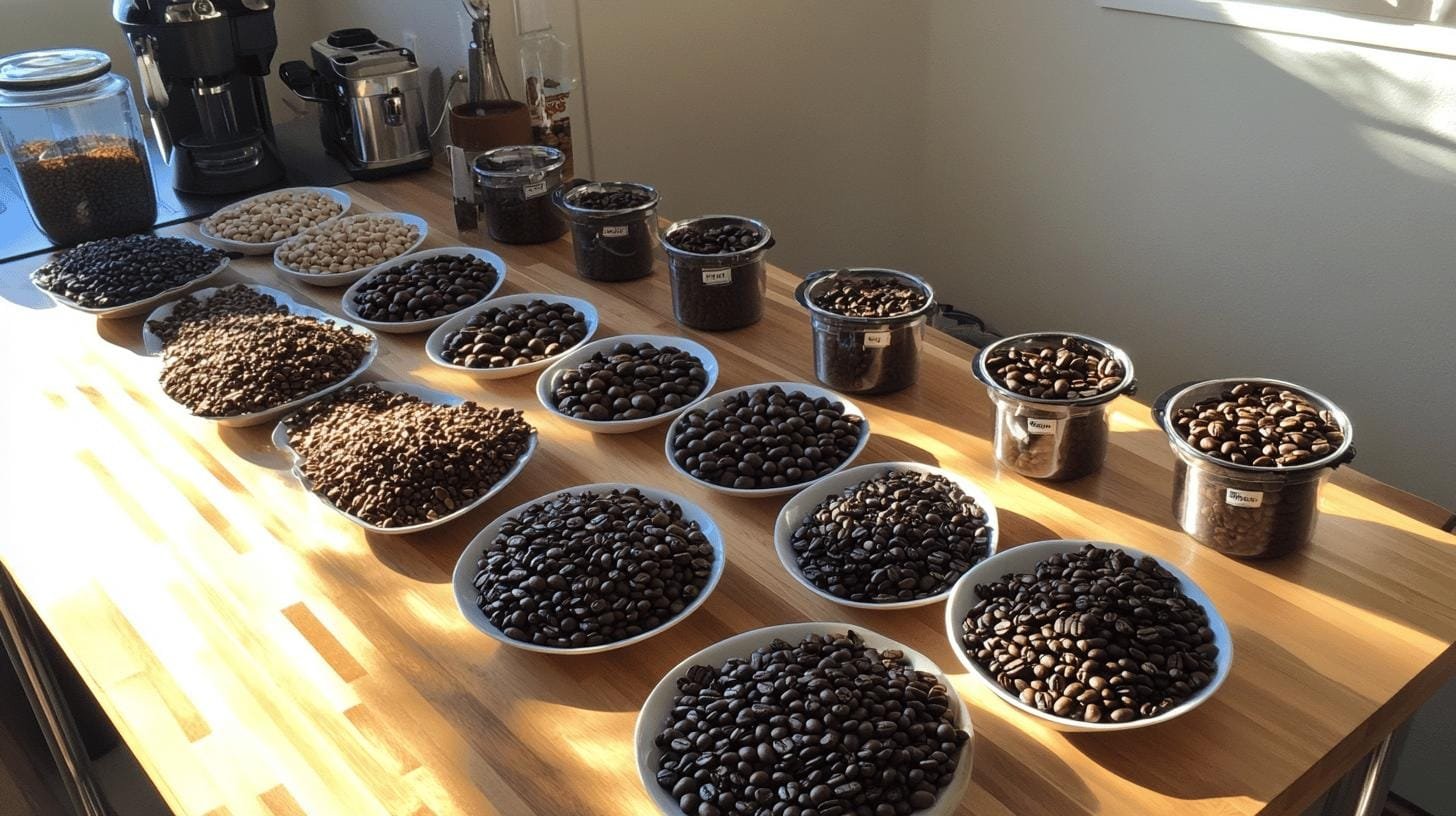
Emerging Approaches Redefining Craft-Focused Customer Experiences
Craft-focused small businesses have always relied on care, precision, and sourcing to stand out. What’s changing now is how those values are shown, not just

What if your morning coffee could potentially influence your cholesterol levels? Coffee aficionados often marvel at the complex flavors of roasted coffee, but seldom ponder its biochemical impacts on the body.
Recent studies have shed light on the intriguing connection between roasted coffee and cholesterol, highlighting both peculiar risks and surprising benefits. By deciphering these positive health insights, readers can navigate their coffee rituals with informed precision.
The main influence comes from compounds called diterpenes, specifically cafestol and kahweol. These compounds vary in amount depending on how coffee is brewed. Unfiltered methods, like French press and espresso, keep more of these diterpenes, which may raise cholesterol levels. So, how you brew coffee is crucial in its impact on cholesterol.
Cafestol and kahweol significantly contribute to coffee’s cholesterol effects. Found in coffee’s oily parts, these diterpenes are higher in unfiltered coffees. Studies show they can raise LDL cholesterol, known as “bad” cholesterol, linked to heart disease. For those drinking unfiltered coffee, this can be worrisome, especially if they are prone to high cholesterol.
Besides cafestol and kahweol, individual genetics, diet, and lifestyle also affect cholesterol levels. Some people might be more genetically prone to these compounds’ effects. Also, eating habits and lifestyle choices, such as exercise and stress management, can either worsen or reduce coffee’s impact on cholesterol. Understanding these factors is important for managing cholesterol while enjoying coffee.

Roasting greatly changes diterpene levels, like cafestol and kahweol, in coffee. During roasting, these compounds undergo changes that can alter their concentration. Dark roasts, exposed to high temps and longer roasting, usually break down more cholesterol-raising compounds. Thus, they tend to have fewer diterpenes than lighter roasts.
Comparing roasting levels on cholesterol impact:
Darker roasts have fewer cholesterol-raising compounds, making them preferable for minimizing coffee’s cholesterol impact while enjoying rich flavors.
Brewing determines the levels of cholesterol-raising compounds in coffee. Certain unfiltered methods let more diterpenes like cafestol and kahweol remain in the brew, increasing LDL cholesterol. Thus, the brewing choice is important for those monitoring cholesterol.
Unfiltered brewing methods raise cholesterol. These methods, like using a French press or espresso, don’t remove oily cafestol and kahweol. These diterpenes raise cholesterol. Without a filter, they pass into coffee, potentially raising LDL cholesterol. Regular unfiltered coffee consumption can increase cholesterol for some.
Using paper filters, filtered brewing methods capture and remove much cafestol and kahweol. Filtering lowers the brew’s cholesterol contribution, making filtered coffee a healthier choice for heart and cholesterol health.
Filtered coffee is advisable for cholesterol concerns. Paper filters can significantly reduce cholesterol-raising compounds, making it safer for heart health.

Moderate coffee consumption offers several health advantages. Studies show that regular drinkers might have reduced risks of Alzheimer’s, Parkinson’s, and some liver diseases. Coffee’s antioxidants and caffeine offer protection against cell damage and inflammation. This makes coffee a valuable health component when consumed in moderation.
The main concern with coffee and cholesterol is the presence of diterpenes, like cafestol and kahweol. Cafestol can elevate LDL cholesterol, raising cardiovascular disease risks. Still, filtered coffee removes most compounds, posing less of a cholesterol threat.
Moderation is crucial for balancing enjoyment with cholesterol management. Consuming three to four cups daily minimizes cholesterol elevation risks. Choose filtered over unfiltered methods and use paper filters to enjoy coffee while maintaining healthy cholesterol levels.
Coffee affects cholesterol, but it’s only one dietary and lifestyle factor. A balanced diet rich in fruits, vegetables, whole grains, and lean proteins, combined with exercise and stress management, is crucial for healthy cholesterol. By integrating these elements with mindful coffee habits, individuals can enjoy coffee’s benefits while maintaining cardiovascular health.
Assessing the relationship between roasted coffee and cholesterol levels involves understanding various factors. The impact depends on the coffee’s compounds, such as cafestol and kahweol, and individual variables like genetics and lifestyle.
Exploring different roasting levels and brewing methods reveals that darker roasts and filtered brewing techniques can minimize cholesterol-raising components. Despite some risks, coffee offers numerous health benefits when consumed in moderation.
Balancing roasted coffee enjoyment with cholesterol management is attainable. By choosing the right roast and brewing method, individuals can savor coffee while maintaining heart health.
Coffee filtered through paper filters can help reduce cholesterol-raising compounds. Opting for filtered coffee is beneficial for individuals concerned about cholesterol levels.
Quitting coffee entirely may not be necessary. Switching to filtered coffee and moderating intake can help minimize its impact on cholesterol levels.
Filtered coffee is the best choice for those with high cholesterol. It reduces cholesterol-raising compounds, particularly when combined with moderate consumption.
Dark roast coffee contains fewer cholesterol-raising compounds than light roasts. Opting for dark roasts may aid in managing cholesterol levels effectively.
Decaf coffee contains similar amounts of cafestol and kahweol as regular coffee but is often consumed in lower amounts, potentially reducing overall intake of cholesterol-raising compounds.
Unfiltered coffee contains cafestol and kahweol, which may increase LDL cholesterol. Choosing filtered coffee methods can help mitigate this risk.

Craft-focused small businesses have always relied on care, precision, and sourcing to stand out. What’s changing now is how those values are shown, not just

How can brands create a more balanced and memorable customer experience by blending artisanal product quality with thoughtful everyday rituals that keep people coming back?

Independent coffee shops have always been about more than caffeine—they’re hubs of creativity, connection, and care. As café culture continues to evolve, new trends are

Introduction Independent cafes win when they feel like the neighborhood’s living room and operate with the discipline of a great kitchen. Below is a quick

Discover how top specialty coffee brands create lasting loyalty through storytelling, sourcing, and community connection. Real tips from 6 industry experts.

Discover the ultimate showdown between two beloved coffee brewing methods: the French press and Chemex. Explore how each technique caters to distinct palates, with the French press delivering bold flavors and the Chemex presenting a bright, clean taste.

Unlock the secrets to brewing the perfect cup of coffee with our comprehensive guide on using a coffee scale. Discover how precise measurements enhance flavor and consistency while eliminating bitterness.

Discover how water temperature plays a vital role in brewing the perfect cup of coffee. This article delves into the ideal temperature range of 195°F to 205°F for optimal flavor extraction, enhancing the enjoyment of high-quality beans.

Discover the world of curated specialty coffee bundles, perfect for enthusiasts seeking quality and craftsmanship. This article explores the benefits of ethically sourced, small-batch beans from brands like Equipoise Coffee, offering diverse flavor profiles that elevate your brewing experience.